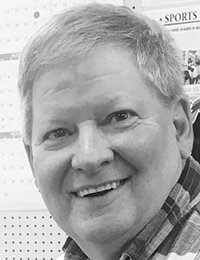Support the Timberjay by making a donation.
Resolve to move beyond the chaos of the day
As I was scrolling through my Facebook news feed the other day, I ran across a meme that seemed familiar, a picture of a row of porta-potties engulfed in flames with the caption “If 2021 was a …
This item is available in full to subscribers.
Attention subscribers
To continue reading, you will need to either log in to your subscriber account, or purchase a new subscription.
If you are a current print subscriber, you can set up a free website account and connect your subscription to it by clicking here.
If you are a digital subscriber with an active, online-only subscription then you already have an account here. Just reset your password if you've not yet logged in to your account on this new site.
Otherwise, click here to view your options for subscribing.
Please log in to continue |
Resolve to move beyond the chaos of the day
As I was scrolling through my Facebook news feed the other day, I ran across a meme that seemed familiar, a picture of a row of porta-potties engulfed in flames with the caption “If 2021 was a scented candle ….”
A quick Google search ensued, and sure enough, those toasty toilets had already made the social media rounds last year, then captioned “If 2020 was a scented candle ….”
Welcome, it seems, to our new normal.
Common to both years has been the unrelenting coronavirus pandemic. More mind-boggling to me than the loss of more than 800,000 American lives, including more than 10,000 Minnesotans, is the callousness of how readily so many people accept and dismiss them.
With great fanfare and solemnity, this past September we collectively marked the tragic deaths of nearly 3,000 people who died in the horrific terrorist attacks of 9/11, and rightly so. Yet more than 266 times that many have died since the start of the pandemic, more than 5,000 on a single day last February.
But because they haven’t been gathered together by the hundred and thousands when they passed, there’s been no coming together as a nation to mourn. Perhaps that’s because there’s no closure, no end in sight, and no malevolent enemy to blame. Surely, some people have tried to place the blame on China, and as a result many have lashed out with unjustified malice toward people closer at hand– hate crimes against Asian Americans rose 76 percent in 2020 and continued apace in 2021.
Equally as tragic to me is how a virus that does not discriminate based on party affiliation has become politically weaponized. The pandemic in the U.S. has inflamed a nasty, bitter political divide the likes of which I don’t think we’ve seen as a nation in my 60-plus years on the planet. To be sure, that divide had been growing for nearly three decades, but the current level of vitriol, particularly from many conservatives, is as bad if not worse than that of the fever-pitched witch hunts of the McCarthy era.
The government-dictated lockdowns and restrictions and mandates implemented to combat the pandemic provided fertile fuel for a firestorm of extremist rhetoric and actions that have pitted American against each other. For most of my life, Republicans and Democrats staked out their positions without acting as if they were mortal enemies. That’s no longer the case. Officials who have acted to protect public health have been hung or burned in effigy, and to those opposed to any restrictions, those who support them are un-American, anti-freedom, socialists, fascists, etc. They’re the enemies of America and “true” American “patriots.”
Of course, this is something that goes well beyond mere reactions to the pandemic. Some would blame Donald Trump, but I see him more as a dangerous and willing catalyst for extremism that had been building well before his first campaign for president.
Trump didn’t create the discontent, but he embraced it, amplified it, gave voice to it at the highest level. He demonized his opponents as un-American, right down to a campaign survey where respondents were given the choice to identify as “American” or “Democrat.” He won the embrace of evangelical Christians who would have scorned any Democrat who behaved as he did as the Antichrist.
His deliberate self-aggrandizing and malicious attempts to undermine the integrity of our electoral system, to proclaim that he could only lose if there was massive voter fraud and then persist in his fraudulent claim that it happened despite any evidence at all, have caused the U.S. Capitol to come under violent siege and threatened the very foundation of our representative democracy.
These divisions are difficult enough to deal with in “normal” times. With the added stress and uncertainties of the pandemic sapping our strength and vision, it’s virtually impossible to make any headway.
And so, the image of Johnny-on-the-Spots going up in flames rings too sadly true for the present day.
But now is that time of year we always look to the future. It’s a time we engage in the age-old tradition of making resolutions for a new year, to do something to better ourselves and our communities.
Now, more than ever, we need resolve. Resolve to minimize our differences. Resolve to rediscover those things which cause us to reach for a common good. Resolve to rid ourselves of hate and willful ignorance.
And to do that, I can think of no better New Year’s resolution for us all than to suggest these very familiar, very American words, with the hope that each of us will embrace the ideals they embody in our simple everyday interactions and long-term aspirations for ourselves, our neighbors, and our fellow Americans:
“RESOLVED: “We the People of the United States RESOLVE to form a more perfect Union, establish Justice, insure domestic Tranquility, provide for the common defense, promote the general Welfare, and secure the Blessings of Liberty to ourselves and our Posterity.”






